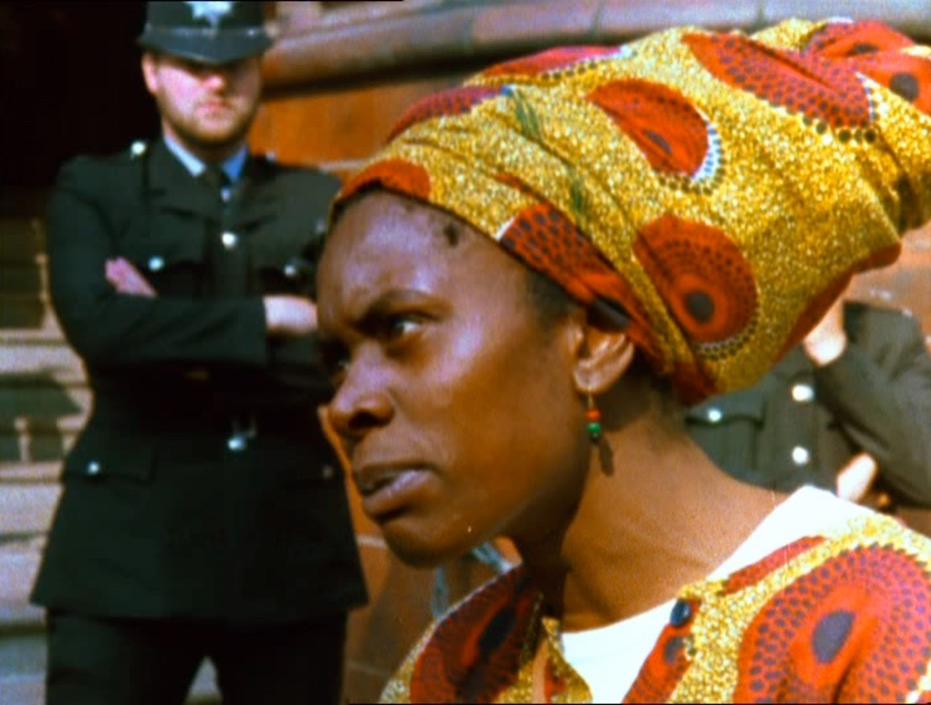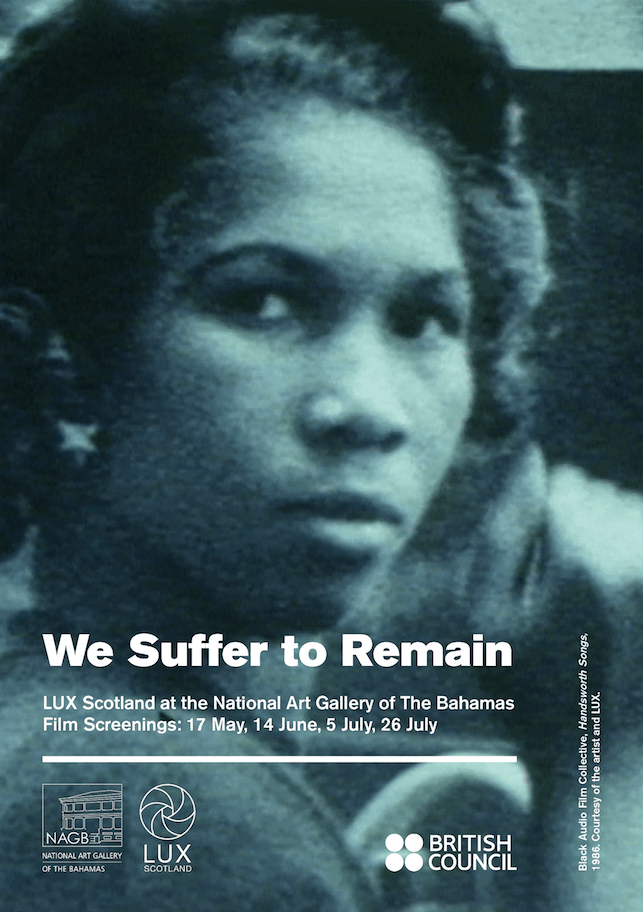
As part of the exhibition We Suffer to Remain at the National Art Gallery of The Bahamas (22 March – 29 July 2018), LUX Scotland presents a film series that brings together a selection of artists’ moving image work from Scotland, the UK and the greater African diaspora, with titles drawn from the LUX collection. We Suffer to Remain engages with the complex intersectional histories across Scotland and the Caribbean to make sense of the vestiges and trauma of slavery, featuring work by Bahamian artists Sonia Farmer, Anina Major and John Beadle alongside Graham Fagen’s installation The Slave’s Lament (2015), commissioned by Hospitalfield for Scotland + Venice at the 56th Venice Biennale in 2015.
Traversing a deep history of transatlantic captivity, this four-part screening series places contemporary voices alongside more established positions in an attempt to map the pathology of colonisation and the subsequent consequences of decolonisation across generations. It examines forms of cultural transformation and deformation, politics of refusal and liberation, colonial legacies of exploitation and control, and the ongoing violence of these histories within both personal and collective experiences. The programmes feature work by artists including Ayo Akingbade, Ephraim Asili, Black Audio Film Collective, Helen Cammock, Louis Henderson, Isaac Julien, Ursula Mayer, Keith Piper, Camara Taylor, Alberta Whittle and others.

The project is curated by LUX Scotland Director Nicole Yip and is supported by the British Council.
Programme I: One Turn of the Revolution
Thursday 17 May, 8pm
One Turn of the Revolution is conceived in solidarity with the current campaign on behalf of the citizens and children of the ‘Windrush generation’ of Caribbean migrants to the UK, who have not only been faced with the threat of deportation, but also been seized and imprisoned, stripped of their rights, outlawed and exiled, and treated like criminals in their own country. The Black Audio Film Collective’s seminal film essay Handsworth Songs(1986) brings into focus the brutal policing, racism and criminalisation faced by communities of black immigrants in 1980s Britain, many of whom arrived from the West Indies at the invitation of the British government to help rebuild the country after the devastation of the Second World War. It is important to resist the casual story that things may have ‘progressed’ since then – some 30 years later, Theresa May’s ‘hostile environment’ policy continues to scapegoat and persecute innocent people and blame immigrants for the ills of contemporary British society. Alberta Whittle’s video collage Sorry, not sorry (2018) is at once a call for justice for the Windrush generation and a reminder of the many things that have remain unchanged over the years, as the Caribbean continues to serve as a site of extraction and fantasy from whose labour the UK continues to profit.
One turn of the revolution brings us back to where we began; as MP David Lammy (citing the late cultural theorist Stuart Hall) said, ‘we are still the sugar at the bottom of your British cup of tea’.
Black Audio Film Collective, Handsworth Songs, 1986. Courtesy of the artists and LUX.
Programme:
Black Audio Film Collective, Handsworth Songs, 1986. 16mm transferred to video, 59 min.
Alberta Whittle, Sorry, not sorry, 2018. HD video, 6 min.
Total running time: 65 min
Programme II: Poetics of the Undercommons
Thursday 14 June, 8pm
Poetics of the Undercommons explores spoken word, poetry and lyrical prose as sites of resistance and liberation, framing the way the voice can embody a space of both individual and collective agency. The programme takes its title from a publication by the poet and scholar Fred Moten, who imagined a ‘poetics of the undercommons’ as not only an aesthetic practice, but also a social poesis – a constant process through which people make one another and the sociality in which they live.
Programme
Ayo Akingbade, Tower XYZ, 2016. 16mm transferred to video, 3 min.
Ephraim Asili, Fluid Frontiers, 2017. 16mm transferred to HD, 23 min.
Louis Henderson, The Sea is History, 2016. HD video, 28 min.
Helen Cammock, There’s a Hole in the Sky, 2016. HD video, 11 min.
Total running time: 65 min

Still from Ayo Akingbade, Tower XYZ, 2016.
Details of Programmes III (5 July) & IV (26 July) will be announced shortly.
LUX Scotland is a non-profit agency dedicated to supporting, developing and promoting artists’ moving image practices in Scotland. Working at the intersection of the contemporary visual arts and film sectors, its core activities include public exhibition and touring projects, learning and professional development for artists and arts professionals, distribution, commissioning and production support, research and sector advocacy. From its offices based in Glasgow, LUX Scotland works with a growing network of national and international partners, including museums, contemporary art organisations, film festivals and educational institutions, to deliver its programme. Established in 2014, LUX Scotland is a part of LUX and is supported by Creative Scotland.
www.luxscotland.org.uk
Nicole Yip is a curator and writer based in Glasgow. She has been Director of LUX Scotland since 2016 and was previously Special Projects Curator at LUX. She has curated exhibitions, film screenings and projects at venues including Tramway, Glasgow; the Kochi-Muziris Biennale; Centre Pompidou, Paris; Firstsite, Colchester; The Showroom, London and Institute of Contemporary Arts, London, where also worked on the inaugural LUX/ICA Biennial of Moving Images (2012). She is a contributor to Frieze magazine and co-editor of publications including Xerography (Colchester: Firstsite, 2013) and Ulises Carrión: Gossip, Scandal and Good Manners (London: Royal College of Art, 2010). She has been a jury member for numerous international film festivals and awards, including the inaugural Glasgow International Artists’ Prize (2018), VIDEONALE.16 Festival for Video and Time-Based Arts (2017), and the Margaret Tait Award (2016–ongoing).